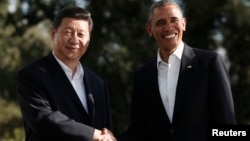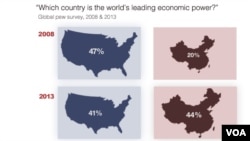A new public opinion survey indicates that Chinese and American attitudes towards each others’ countries have dimmed in the past two years. The Pew Global Survey, released Thursday, shows that only 37 percent of Americans expressed a positive view of China, down from 51 percent two years ago.
The situation in China is not much better, where just 40 percent of people reported viewing the United States in a positive light.
Some commentators in China believe that such findings do not signify a substantial change in how the two countries view each other.
“These things are like the stock market, or ranking at universities,” said Rui Chenggang, a news anchor at China's state broadcaster, CCTV, “There are ups and downs.”
The poll offers some clues to explain the shift in perception.
In the United States, as well as in other countries surveyed in the poll, many think that China will eventually replace the United States as the world's dominant superpower, and such perceptions appear to have negatively impacted China's rankings.
“Favorability towards China has fallen 14 percentage points in the United States, 11 points in Britain and 9 points in France,” the survey found.
Pew researchers said those are likely the result of unease about China as a commercial competitor and a perception of Chinese unilateralism in foreign affairs.
China rising
Rui says that media exposure of China's rise in the world is a contributing factor of American's mistrust of Beijing.
“If you are the owner of a U.S. company and all you hear is stories of Chinese companies taking over the movie theatre chain that you have grew up with over the years, called AMC, you get a little bit scared,” he said.
China's fast paced economic growth ranked more positively among developing countries, including countries in Africa and South America, where China’s scientific and technological advances were found to be the most widely appreciated.
Yet, when it comes to foreign policy, the poll reported that half or more of the respondents in 26 of 38 nations think that China acts unilaterally in international affairs.
Xie Tao, professor of political science at Beijing Foreign Studies Universities, said that China's ongoing confrontations in the South and East China Sea have greatly contributed to this reputation.
“We are engaged in many maritime disputes, and we insist on bilateral negotiation, and we do not want others to get involved,” he said. “If you put all these pieces together you can portray a picture of China that is increasingly assertive, and unilateral.”
Outside pressure
Yet Xie said that territorial disputes among China and its neighbors are also partly responsible for the way Chinese people perceive the outer world, including the United States.
“When you look at China’s problems with Japan, China's problems with the Philippines, I think there is this growing belief that America is actively trying to limit the rise of China, trying to strengthen its own alliances in Asia so to edge off against any potential Chinese threat,” he said.
Xie also pointed out another observation of the survey: that most Chinese people believe their country should be more respected around the world.
He said this finding shows that Chinese people would like other countries to behave more deferentially towards China.
“In their minds [this means that] when China is engaged in these territorial disputes, these countries should not be so confrontational. So they should really back off," he added.
The Pew Global Survey polled over 37,000 people among 39 countries, including more than 3,000 people in China and more than 1,000 in the United States.
The situation in China is not much better, where just 40 percent of people reported viewing the United States in a positive light.
Some commentators in China believe that such findings do not signify a substantial change in how the two countries view each other.
“These things are like the stock market, or ranking at universities,” said Rui Chenggang, a news anchor at China's state broadcaster, CCTV, “There are ups and downs.”
The poll offers some clues to explain the shift in perception.
In the United States, as well as in other countries surveyed in the poll, many think that China will eventually replace the United States as the world's dominant superpower, and such perceptions appear to have negatively impacted China's rankings.
“Favorability towards China has fallen 14 percentage points in the United States, 11 points in Britain and 9 points in France,” the survey found.
Pew researchers said those are likely the result of unease about China as a commercial competitor and a perception of Chinese unilateralism in foreign affairs.
China rising
Rui says that media exposure of China's rise in the world is a contributing factor of American's mistrust of Beijing.
“If you are the owner of a U.S. company and all you hear is stories of Chinese companies taking over the movie theatre chain that you have grew up with over the years, called AMC, you get a little bit scared,” he said.
China's fast paced economic growth ranked more positively among developing countries, including countries in Africa and South America, where China’s scientific and technological advances were found to be the most widely appreciated.
Yet, when it comes to foreign policy, the poll reported that half or more of the respondents in 26 of 38 nations think that China acts unilaterally in international affairs.
Xie Tao, professor of political science at Beijing Foreign Studies Universities, said that China's ongoing confrontations in the South and East China Sea have greatly contributed to this reputation.
“We are engaged in many maritime disputes, and we insist on bilateral negotiation, and we do not want others to get involved,” he said. “If you put all these pieces together you can portray a picture of China that is increasingly assertive, and unilateral.”
Outside pressure
Yet Xie said that territorial disputes among China and its neighbors are also partly responsible for the way Chinese people perceive the outer world, including the United States.
“When you look at China’s problems with Japan, China's problems with the Philippines, I think there is this growing belief that America is actively trying to limit the rise of China, trying to strengthen its own alliances in Asia so to edge off against any potential Chinese threat,” he said.
Xie also pointed out another observation of the survey: that most Chinese people believe their country should be more respected around the world.
He said this finding shows that Chinese people would like other countries to behave more deferentially towards China.
“In their minds [this means that] when China is engaged in these territorial disputes, these countries should not be so confrontational. So they should really back off," he added.
The Pew Global Survey polled over 37,000 people among 39 countries, including more than 3,000 people in China and more than 1,000 in the United States.






